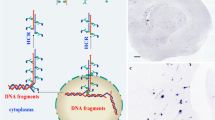Abstract
While there have been many reports concerning the clinical significance of bcl-2 expression in human breast cancer, little is known about apoptosis in primary breast cancers. We immunohistochemically examined DNA fragmentation in 107 primary human breast cancers from Japanese women using an antibody specific to single-stranded DNA. The apoptosis index, calculated as the product of the positive cell number and the cellularity coefficient, ranged from 0 to 48. The average incidence of apoptosis was calculated as 0.1% of tumor cells. No relationships were observed among the apoptosis index, expression of bcl-2, and the histological grade of the tumors. Almost all apoptotic cells were phagocytosed by surrounding tumor cells immediately after DNA fragmentation. Apoptotic body formation was rare. The apoptotic cells seemed to be degraded within phagocytes, leaving no trace of apoptosis except the tiny shells of nuclei. The intensive phagocytic reaction might be one of the main reasons for the low incidence of apoptosis in human breast cancers.
Similar content being viewed by others
References
Oltvai ZW, Milliman CL, Korsmeyer SJ: Overexpression of Bax accelerates apoptosis induced by cytokine deprivation in an IL-3-dependent cell line.Cell 74:609–619, 1993.
Sakakura C, Sweeney EA, Shirahama T,et al: Over-expression of bax enhances the radiation sensitivity in human breast cancer cells.Surg Today 27:90–93, 1997.
Huang Y, Ray S, Reed JC,et al: Estrogen increases intracellular p26Bcl-2 to p21Bax ratios and inhibits taxol-induced apoptosis of human breast cancer MCF-7 cells.Breast Cancer Res Treat 42:73–81, 1997.
Joensuu A, Pylkkanen L, Toikkanen S: Bcl-2 protein expression and long-term survival in breast cancer.Am J Pathol 145:1191–1198, 1994.
Lipponen P, Eskelinen M, Syrjanen K: Expression of tumor-suppressor gene Rb, apoptosis-suppressing protein Bcl-2 and c-Myc have no independent prognostic value in renal adenocarcinoma.Br J Cancer 71:863–867, 1995.
Baretton GB, Debold J, Christoforis G,et al: Apoptosis and immunohistochemical bcl-2 expression in colorectal adenomas and carcinomas; Aspects of carcinogenesis and prognostic significance.Cancer 77:255–264, 1996.
Kobayashi S, Iwase H, Ito Y,et al: Clinical significance of bcl-2 expression in human breast cancer tissues.Breast Cancer Res Treat 42:173–181, 1997.
Steck K, McDonnell T, Sneige N,et al: Flow cytometric analysis of apoptosis and bcl-2 in primary breast carcinomas; Clinical and biological implications.Cytometry 24:116–122, 1996.
Frankfurt OS, Robb JA, Sugarbaker EV,et al: Apoptosis in breast carcinomas detected with monoclonal antibody to single-stranded DNA; Relationship to bcl-2 expression, hormone receptors, and lymph node metastases.Clinical Cancer Res 3:465–471, 1997.
Naruse I, Keino H, Kawarada Y: Antibody against single-stranded DNA detects both programmed cell death and drug-induced apoptosis.Histochemistry 101:73–78, 1994.
Elston CW, Ellis IO: Pathological prognostic factors in breast cancer, I; The value of histological grades in breast cancer; Experience from a large study with long-term follow-up.Histopathology 19:403–410, 1991.
Frierson HF Jr, Wolber RA, Berean KW,et al: Interobserver reproducibility of the Nottingham modification of the Bloom and Richardson histologic grading scheme for infiltrating ductal carcinoma.Am J Clin Pathol 103: 195–198, 1995.
Bloom HJG, Richardson WW: Histological grading and prognosis in breast cancer; A study of 1409 cases of which 359 have been followed for 15 years.Br J Cancer 11:359–377, 1957.
Wakizaka A, Okuhara E: Immunological studies on nucleic acids; An investigation of the antigenic determinants of denatured deoxyribonucleic acid (DNA) reactive with rabbit anti-DNA antisera by a radioimmunoassay technique.Immunochemistry 12:843–845, 1975.
Yamada H, Ikegami S, Kawarada Y,et al: The fate of DNA originally existing in the zygote nucleus during achromosomal cleavage of fertilized echinoderm eggs in the presence of aphidicolin; Microscopic studies with anti-DNA antibody.J Cell Physiol 124:9–12, 1985.
Keino H, Masaki S, Kawarada Y,et al: Apoptotic degeneration in the arhinencephalic brain of the mouse mutantPdn/Pdn.Brain Res Dev Brain Res 78:161–168, 1994.
Adam L, Grepin M, Israel L: Tumor growth inhibition, apoptosis, and Bcl-2 down-regulation of MCF-7ras tumors by sodium phenylacetate and tamoxifen combination.Cancer Res 57:1023–1029, 1997.
Bhargava V, Kell DL, vd-Rijn M,et al: Bcl-2 immunoreactivity in breast carcinoma correlates with hormone receptor positivity.Am J Pathol 145:535–540, 1994.
Hellemans P, Van Dam PA, Weyler J,et al: Prognostic value of bcl-2 expression in invasive breast cancer.Br J Cancer 72:354–360, 1995.
Nakagawa S, Shiraishi T, Kihara S,et al: Detection of DNA strand breaks associated with apoptosis in human brain tumors.Int J Pathol 427:175–179, 1995.
Koizumi H, Wakizaka M, Nakada K,et al: Demonstration of apoptosis in neuroblastoma and its relationship to tumor regression.Int J Pathol 427:167–173, 1995.
Saegusa M, Takano Y, Wakabayashi T,et al: Apoptosis in gastric carcinomas and its association with cell proliferation and differentiation.Jpn J Cancer Res 86:743–748, 1995.
Hasse KL, Babcook GF, Askew DS, Cook-Mills JM: A novel flow cytometric method for quantifying phagocytosis of apoptotic cells.Cytometry 27:145–152, 1997.
Kawabuchi M, Nakamura K, Hirata K,et al: Morphological study of thymus stromal cells (TEL-2 cell) which play a role in the elimination of double positive immature thymocytes by phagocytosis.Anat Rec 244:271–283, 1996.
Buchi ER, Bernauer W, Daicker B: Cell death and disposal in retinoblastoma; An electron microscopic study.Graefes Arch Clin Exp Ophthalmol 232:635–645, 1994.
Author information
Authors and Affiliations
About this article
Cite this article
Kobayashi, S., Iwase, H., Kawarada, Y. et al. Detection of DNA fragmentation in human breast cancer tissue by an antibody specific to single-stranded DNA. Breast Cancer 5, 47–52 (1998). https://doi.org/10.1007/BF02967414
Received:
Accepted:
Issue Date:
DOI: https://doi.org/10.1007/BF02967414




